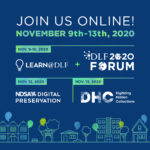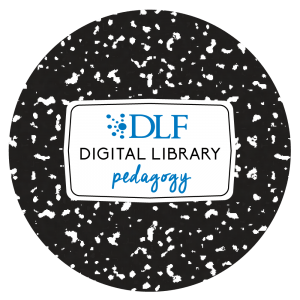 Though DLF is best known for our signature event, the annual DLF Forum, our working groups collaborate year round. Long before COVID-19 introduced the concept of “Zoom fatigue” into our lives, DLF’s working groups organized across institutional and geographical boundaries, building community while apart, to get work done. Made possible through the support of our institutional members, working groups are the efforts of a committed community of practitioners, using DLF as a framework for action, engaged in problem-solving in a variety of digital library subfields from project management and assessment to labor and accessibility.
Though DLF is best known for our signature event, the annual DLF Forum, our working groups collaborate year round. Long before COVID-19 introduced the concept of “Zoom fatigue” into our lives, DLF’s working groups organized across institutional and geographical boundaries, building community while apart, to get work done. Made possible through the support of our institutional members, working groups are the efforts of a committed community of practitioners, using DLF as a framework for action, engaged in problem-solving in a variety of digital library subfields from project management and assessment to labor and accessibility.
Once we decided that the 2020 DLF Forum and affiliated events would be held in a virtual format, it meant that our working groups wouldn’t have the opportunity to meet in person for their typical working meals that take place throughout the Forum; however, this year’s virtual format means that we’ll have more new DLF Forum attendees than ever before. Because DLF’s working groups are open to ALL, regardless of whether you’re affiliated with a DLF member institution or not, we asked leaders of the DLF working groups to introduce their groups and the work they do to the new and returning members of the #DLFvillage in a series of blogs and videos.
We’ll share these working group updates in the days leading to this year’s DLF Forum.
Who are we?

The DLF Digital Library Pedagogy Working Group, commonly referred to as #DLFteach (also our Twitter hashtag), was founded in 2015 and is focused on building a community of practice for those interested in using digital library collections and technology in the classroom. The group is open for anyone to join regardless of your position, academic discipline, or DLF institutional affiliation. Here is what #DLFteach does and the ways you can join us:
Twitter Chats
One of the best ways to get involved with #DLFteach is to participate in a Twitter chat. Our Twitter chats offer a chance to chat with colleagues from all over on different subjects each chat. Every chat has a host or two who plan the topic and write questions that will be tweeted at intervals over the course of one hour. Participants can follow the questions tweeted from the @CLIRDLF handle and respond from their own Twitter account. Hosts will monitor the chat and also tweet frequently. To see all the tweets as they happen, the hashtag #DLFteach is included with every tweet, and participants should likewise add it to their tweets. People can participate as much or as little as possible, ranging from lurking to tweeting answers and replying to others’ tweets.
Twitter chats usually take place at 2-3 PM EST / 11 AM – noon PST on the third Tuesday of every other month. Once or twice a year, the chat will take place at another time for those who cannot make the regular time. You can see previous chats on the group’s wiki. Interested in hosting a chat? Want to suggest a topic? Get in touch with the outreach coordinators of the DLF Digital Library Pedagogy Group!
Past Projects
#DLFteach is a uniquely project-based working group, and we are usually working on a couple of projects at any given time of year. Typically, members propose or are made aware of projects that would benefit from the expertise and dedication of group members working to implement them. If you are interested in our group’s focus and are looking to get involved, you are welcome to propose a project. If you do not have a specific project in mind but still want to get involved, that’s great, too, since these projects offer many opportunities to contribute to the community and the profession.
You may be wondering: What projects does #DLFteach work on? In September 2019, we released #DLFteach Toolkit 1.0, an openly available, peer reviewed collection of lesson plans and concrete instructional strategies edited by Erin Pappas and Liz Rodrigues and featuring the work of many #DLFteach members and affiliates. Check it out to get ideas of how to incorporate digital library collections and technologies into the classroom in structured, reproducible ways. Another 2019 resource developed by #DLFteach is the Teaching with Digital Primary Sources white paper, by Brianna Gormly, Maura Seale, Hannah Alpert-Abrams, Andi Gustavson, Angie Kemp, Thea Lindquist, and Alexis Logsdon, which outlines literacies and considers issues associated with finding, evaluating, and citing digital primary resources. If you are considering using digital primary sources in the classroom, this is an excellent resource to accompany your work with these materials. Additionally, #DLFteach has developed and facilitated workshops at the DLF Forum and Learn@DLF pre-conferences in 2016, 2018, and 2019.
Current Projects
Following the success of the first version released last year, we have issued a call for participation for the #DLFteach Toolkit 2.0, which will focus on instructional strategies using immersive technology. We are looking for both contributors and volunteers to assist with reviewing submissions and producing the Toolkit. Additionally, we are currently working on two blog series! One is focused on ethical issues for multimodal scholarship and pedagogy, and the other, Practitioner Perspectives: Developing, Adapting, and Contextualizing the #DLFteach Toolkit, is collecting interviews from practitioners (via Google Form) who have used or adapted #DLFteach Toolkit lesson plans. Look for these to be published in the coming months as well as calls to participate.
How can you get involved?
Anyone is welcome to join and participate in the Digital Library Pedagogy group and help grow the community of practitioners around teaching with digital library collections and tools. Our next Twitter chat will be on December 15 at 2:00 pm EST and will be focused on ways #DLFteach can help build community and support each other with the projects and ongoing initiatives we work on. Have you used or adapted lesson plans from the #DLFteach Toolkit 1.0? add your voice to Practitioner Perspectives: Developing, Adapting, and Contextualizing the #DLFteach Toolkit, a forthcoming blog series! Just answer our questions on this Google Form. Additionally, please consider joining our Google group and check out our wiki for more information about who we are and what we do.
